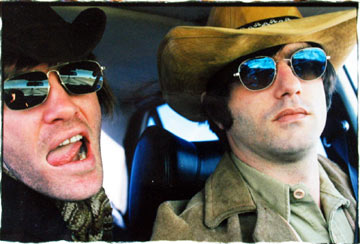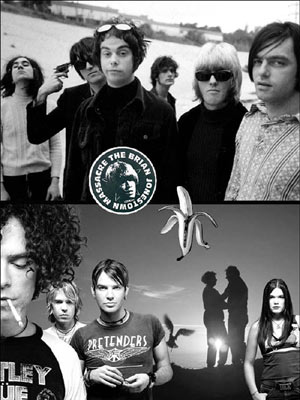DiG!


Taylor narrates the documentary, which was directed by Ondi Timoner (Quiet). Timoner spent so much time with both bands that they were able to confide pretty much everything to her. The Dandys and the Jonestown Massacre both started in Portland. Both bands were friends, and they often played gigs together. Taylor was in awe of Newcombe, the erratic genius. Newcombe could play nearly every instrument, and could record an album in a few days. In the middle of their career, the BJM was releasing multiple albums in one year. Taylor was the polar opposite. He was calm, collected and stable. Timoner posits that he saw a reckless abandon in Newcombe that he could somehow never achieve. Each challenged the other to play and write better music.
Things began to change once the Dandys were signed to a major label. The music executives were grooming them to a huge smash, and when it didn't happen, Taylor and company were disappointed, but still hopeful. They strove to write and play the music they wanted to make, and worked within the confines of the music industry to achieve this. Once a European commerical used their catchy single "Bohemian Like You," their popularity shot up. Similar to the Ramones in End of the Century, they would go across the Atlantic to play in front of thousands of people, then return home to relative obscurity.
BJM did not have it so easy. Labels courted Newcombe, but he seemed much more Eddie Vedder-like about signing. To him, creative freedom was absolute, and signing to a contract was tantamount to selling out. As a bandleader, he was a tyrant. He would hit his band mates when they performed something wrong. They lashed out at audiences, got into fights at gigs, and often walked out. As multiple people remarked, people often went to watch BJM to see what Newcombe would do. He famously got into a fight at the Viper Room concert set up specifically to play for some record executives, sabotaging his own chances at a record deal. But everybody puts up with him because the music he makes is so good. Taylor states that Newcombe is always a few years ahead of everybody else.
What is really interesting is that the two could remain friends so long despite their differences. BJM was akin to a highly dysfunctional family. They were all drug users from broken homes. Taylor remarked late in the film that everybody in the Warhols came from two parent households, and each member had managed to get married and have children despite the rigors of making music and touring. Over the years, Newcombe alienated his own fans, causing BJM to have a constantly changing lineup. Newcombe's attitude towards Taylor changed dramatically as the Dandys became more famous. He pulled weird stunts like sending threats, hoping to ignite some Blur/Oasis-like feud between the two, but the only thing it got him was a restraining order. Taylor and his band mates still have a lot of respect for their old friend, but seem a little sad that things played out the way they did. Newcombe is the type of guy who will never admit he is wrong. He keeps doing the same thing he is doing, regardless of what anybody says.